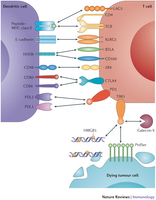Highlights•
T cells undergo metabolic remodeling to support their function.
•Metabolic pathways impact on T cell differentiation decisions and function in the periphery.
•Manipulating metabolic microenvironments may enhance T cell function in cancer.
•Metabolic pathways could be targeted for the treatment of human disease.
In the past several years a wealth of evidence has emerged illustrating how metabolism supports many aspects of T cell biology, as well as how metabolic changes drive T cell differentiation and fate. We outline developing principles in the regulation of T cell metabolism, and discuss how these processes are affected in settings of inflammation and cancer. In this context we discuss how metabolic pathways might be manipulated for the treatment of human disease, including how metabolism may be targeted to prevent T cell dysfunction in inhospitable microenvironments, to generate more effective adoptive cellular immunotherapies in cancer, and to direct T cell differentiation and function towards non-pathogenic phenotypes in settings of autoimmunity.
Via Krishan Maggon



 Your new post is loading...
Your new post is loading...










Trends in Immunology
Volume 36, Issue 2, February 2015, Pages 71–80
Review Targeting T cell metabolism for therapyDavid O'Sullivan, Erika L. Pearce doi:10.1016/j.it.2014.12.004